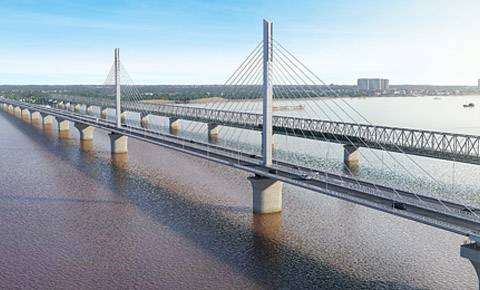Yokogawa Bridge Corporation should end its partnership with a Myanmar military-owned conglomerate, Human Rights Watch (HRW) said on Wednesday, after the Japanese company declined to disclose the status of its partnership.
Myanmar Economic Corporation (MEC) is a conglomerate that generates vast revenue for the military in a variety of sectors. It is also a local subcontractor in the construction of a bridge across the Bago River – a contract awarded to Yokogawa Bridge and Sumitomo Mitsui Construction for 28 billion yen in March 2019.
“If Yokogawa Bridge Corp hasn’t done so already, it should immediately end its partnership with MEC without benefitting Myanmar’s military,” Teppei Kasai, an Asia programme officer at Human Rights Watch, said.
“Otherwise, it will be helping to fund military atrocities and risking its own reputation.”
HRW said that in March 2014, Yokogawa, a wholly-owned subsidiary of Yokogawa Bridge Holdings Corp, signed a memorandum of understanding with MEC, according to a 2015 earnings document.
But in February 2021, Myanmar’s military deposed the civilian government of Aung San Suu Kyi and installed a ruling junta that has been condemned for massacres of civilians and the torture and murder of hundreds of protesters and opponents taken into custody over the past year.
More than 1,500 civilians have been killed and over 10,000 arrested in Myanmar since the coup, according to the Assistance Association for Political Prisoners (AAPP), a human rights group that records killings and arrests by the junta.
Direct Source of Revenue
MEC is owned by Myanmar’s Defence Ministry, and is a “direct source of revenue” for Myanmar’s abusive military, according to HRW.
Yokogawa aims to “build a relationship through technical cooperation,” while “cultivating” MEC into an “amicable steel fabricator,” according to company documents seen by HRW.
“Technological transfer through on-the-job training” for MEC by Yokogawa began in September 2014, including “measures to increase productivity and quality” and “technical guidance of construction engineering,” according to the document.
The Japanese company also created an office in Yangon in July 2015, which the company says acts as a base for “information gathering and technological transfer.”
Yokogawa Bridge Corp’s ties to MEC came under scrutiny after a local media outlet, Myanmar Now, reported in March 2021 that a MEC-owned steel mill was supplying steel for two-thirds of the Japanese government-backed Bago bridge project.
In April 2021, Yokogawa stated that construction of the bridge has been halted due to the “situation on the ground,” and that it would “conduct business that respects human rights.”
- George Russell
READ MORE:
Myanmar Strife Keeping Rare Earth Prices On The Boil
Asean Maintains Hardline Myanmar Stance – SCMP
Australia’s Woodside Exit from Myanmar to Cost $200m
























